Ever wondered why some clients achieve incredible transformations while others struggle to make progress despite your expert guidance?
The secret often lies not in your training program, but in what happens between sessions. In 2025, the best personal training software for accountability, like FitBudd, is revolutionizing client success rates by bridging this crucial gap between sessions—helping trainers track habits, monitor progress, and keep clients engaged even when they’re not training in person.
Why Accountability Apps Are Game-Changers for Personal Trainers
Nowadays, personal trainers face unique challenges. Clients expect results, but may only see you a few hours each week. What happens during the other 165+ hours of their fitness journey, including live classes, can make or break their progress. This is where powerful accountability apps come in, transforming how trainers monitor client adherence, provide feedback, and ultimately deliver results.
The best accountability apps for personal trainers offer much more than simple check-ins. They’ve evolved into comprehensive ecosystems that track progress, monitor habits, facilitate communication, and ultimately strengthen the trainer-client relationship.
A personal training app now serves as a digital hub for all aspects of coaching, support, and accountability, offering tailored workout programs, live coaching, and progress tracking.
With the right accountability tool, including various workout metrics and nutrition tracking, you can extend your coaching presence beyond in-person sessions.
Let’s explore the top 12 accountability apps that are transforming the personal training industry in 2025.
Top 12 Best Accountability Apps for Personal Trainers in 2025
1. FitBudd

FitBudd has emerged as the best personal trainer software and industry leader among accountability apps for personal trainers in 2025. This comprehensive platform addresses virtually every aspect of client accountability and business management.
Key Accountability Features:
- Real-time messaging and video check-ins
- Progress photo comparisons with private galleries
- Comprehensive habit tracking with daily routines
- Detailed progress charts and performance metrics
- Custom-branded app experience for enhanced client retention
FitBudd stands out for its all-in-one approach that combines powerful accountability tools with business features like integrated payment processing and marketing automation. The platform’s user-friendly interface makes client tracking and engagement effortless, allowing trainers to monitor multiple metrics simultaneously.
What truly sets FitBudd apart is its robust progress tracking system. Trainers can monitor detailed metrics, including strength gains, cardio performance, body composition changes, and habit compliance. This data-driven approach enables more targeted programming adjustments than most competing platforms.
For trainers seeking maximum client engagement, FitBudd’s vast library and custom-branded app create a premium client experience that reinforces your personal brand with every interaction..
2. TrueCoach

TrueCoach has built a strong reputation among strength coaches and trainers who prioritize video feedback in their accountability check-ins.
Key Accountability Features:
- Video submission and coach feedback tools
- Exercise library with demonstration videos and step-by-step instructions for each exercise
- Basic progress tracking functionality
- Messaging system for client communication
- Program delivery and scheduling
While TrueCoach excels at video-based feedback, its progress tracking features aren’t as comprehensive as FitBudd’s multi-dimensional approach. The platform is well-suited for trainers who primarily work with strength athletes and prioritize technique feedback.
3. TrainHeroic

TrainHeroic focuses primarily on strength training accountability, making it popular among powerlifting and weightlifting coaches.
Key Accountability Features:
- Workout tracking with leaderboards
- Team and individual messaging
- Performance tracking metrics
- RPE (Rate of Perceived Exertion) tracking
- Basic habit monitoring
TrainHeroic creates accountability through its community features and leaderboards, fostering friendly competition among users to boost motivation and accountability. However, it lacks the comprehensive habit tracking, high-intensity interval training, and nutrition tools found in more complete platforms like FitBudd.
4. Trainerize
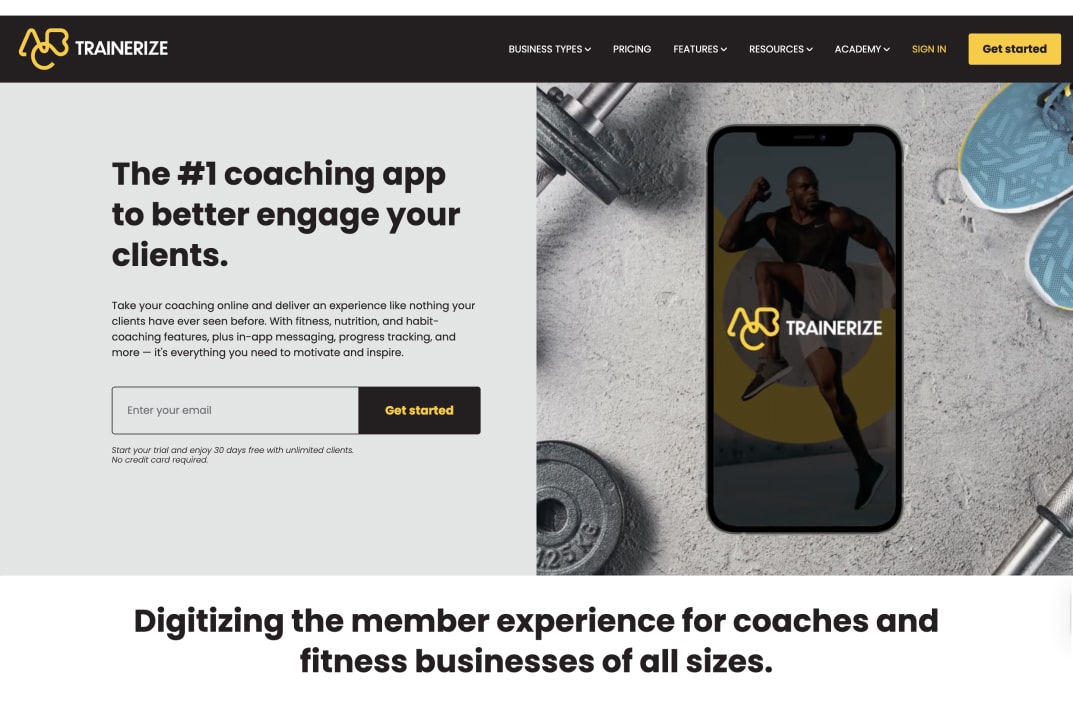
Trainerize has been a mainstay in the personal trainer software market for years and continues to offer solid accountability features in 2025.
Key Accountability Features:
- Client check-in system
- Progress photo comparisons
- Basic messaging functionality
- Workout completion tracking
- Integration with fitness wearables
While Trainerize provides essential accountability tools, many trainers report that its interface isn't as intuitive as newer platforms, and its custom branding options are limited compared to FitBudd's white-label solution.
5. MyPTHub
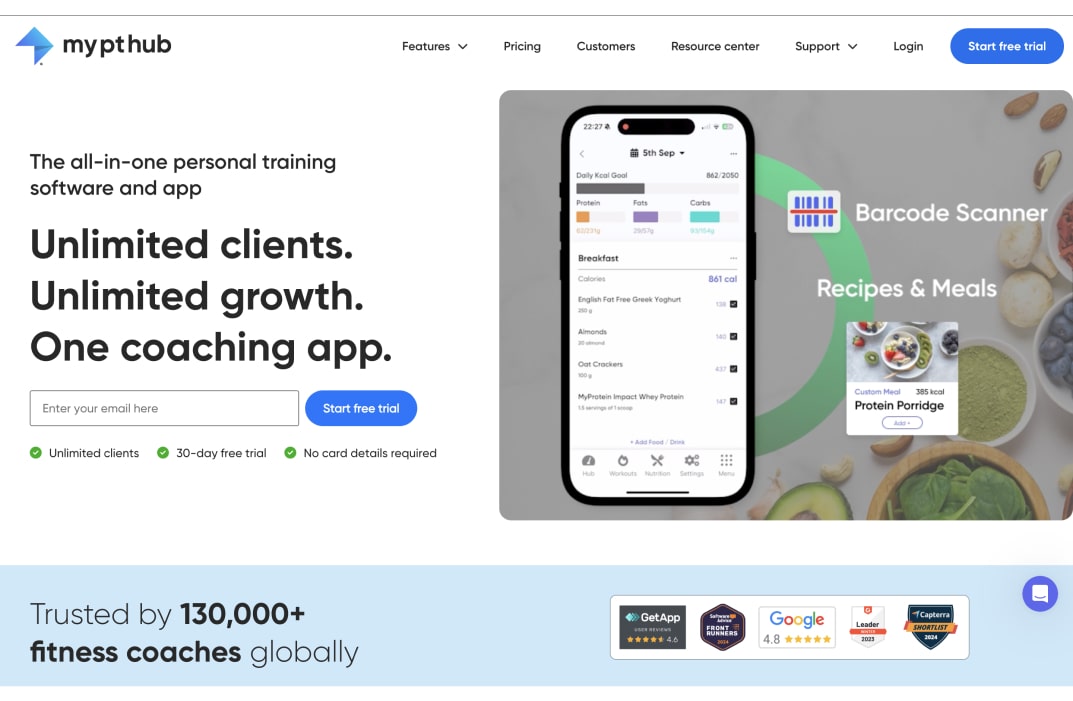
MyPTHub offers UK-based trainers a solid accountability solution with fitness tracking capabilities.
Key Accountability Features:
- Client check-in system
- Basic progress tracking
- Messaging and notification system
- Program delivery tools
- Payment processing
MyPTHub provides adequate accountability features but lacks the depth of habit tracking and progress monitoring found in more comprehensive platforms. Its interface is functional but not as polished as leading competitors.
6. CoachRx
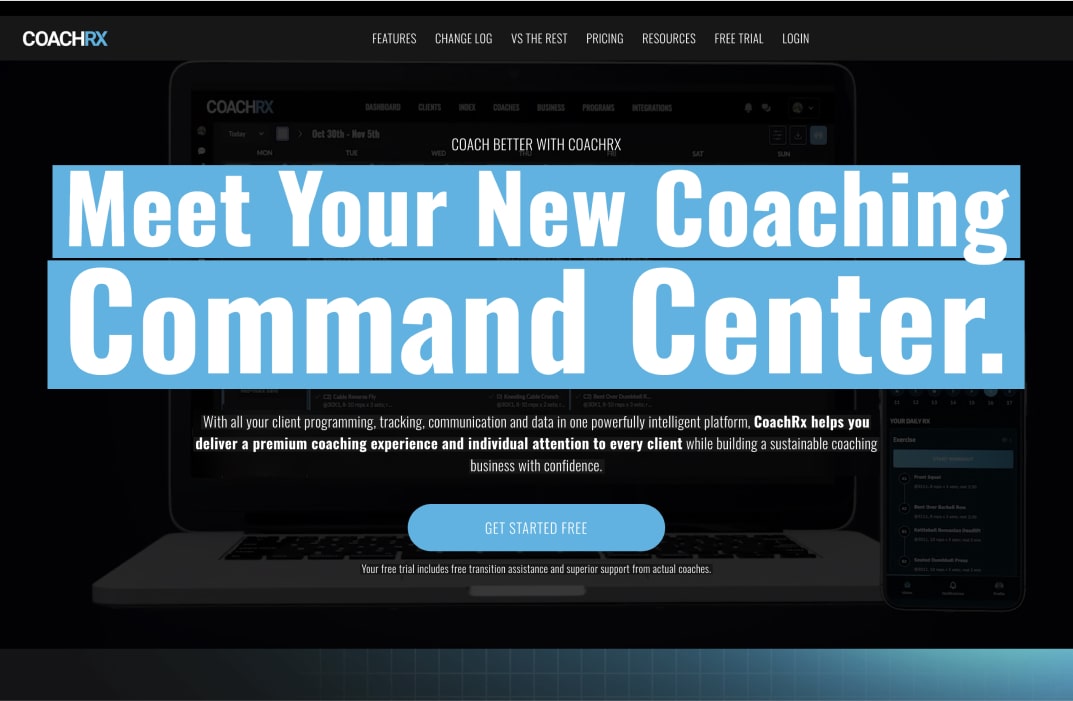
CoachRx takes a unique approach to accountability by focusing on athlete readiness and recovery metrics.
Key Accountability Features:
- Daily readiness assessments
- Recovery tracking
- Sleep quality monitoring
- Basic messaging system
- Workout adjustment recommendations
For trainers who emphasize recovery as part of their accountability approach, CoachRx offers specialized tools not found in more general platforms. However, it lacks the comprehensive business features that would make it a complete solution.
7. Exercise.com
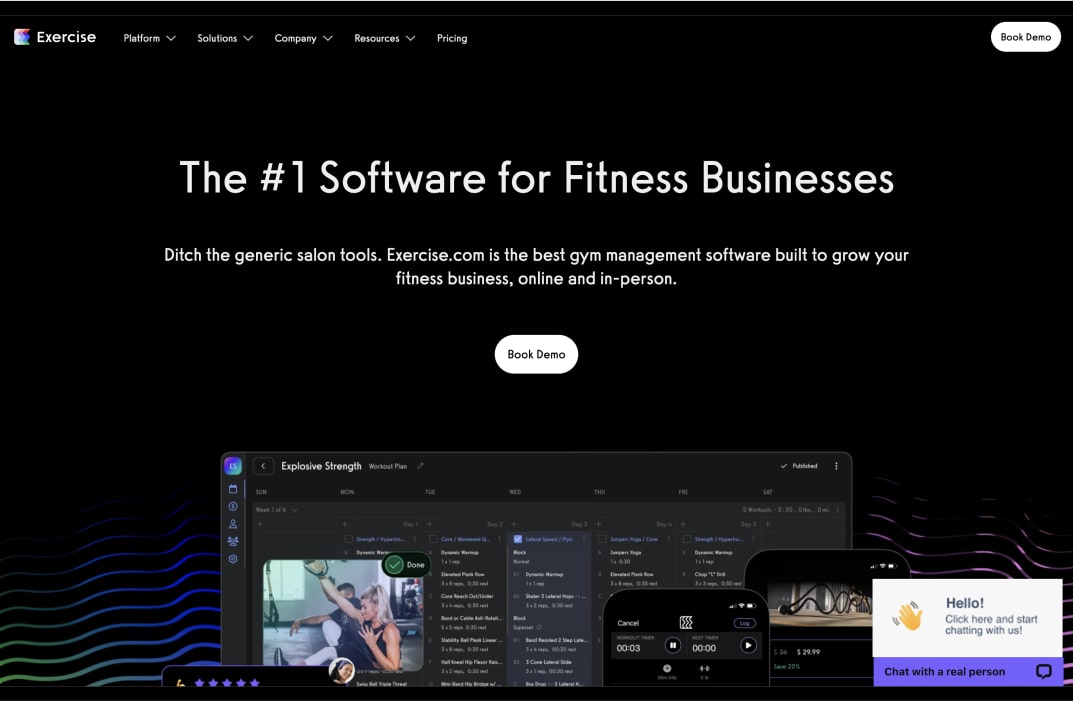
Exercise.com provides personal trainers with a customizable platform that includes accountability features.
Key Accountability Features:
- Custom-branded web and mobile apps
- Workout tracking and logging
- Basic progress metrics
- Messaging system
- E-commerce integration
While Exercise.com offers good customization options, its accountability tools aren't as comprehensive as dedicated platforms like FitBudd. The platform is better suited for trainers who prioritize e-commerce over deep accountability features in their fitness app.
8. PT Distinction
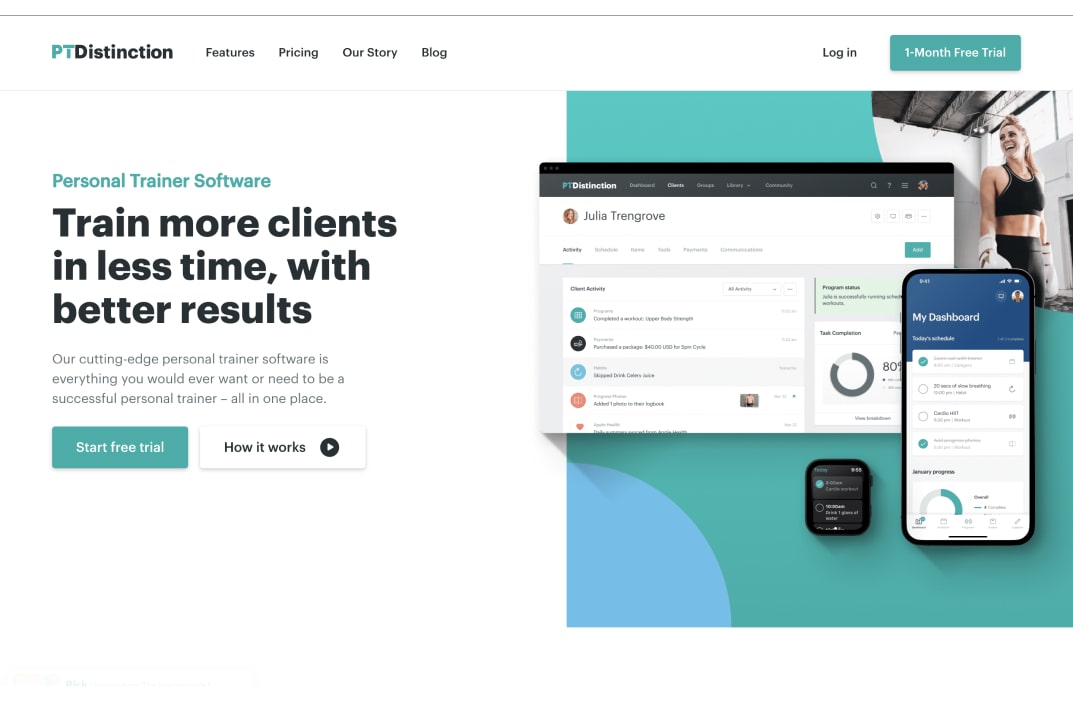
PT Distinction focuses on delivering a premium client experience with solid accountability tools. The platform is particularly well-suited for advanced users who require extensive customization and control over their coaching programs.
Key Accountability Features:
- Client habit tracking
- Progress photo comparisons
- Custom forms and questionnaires
- Messaging and video calls
- Goal-setting functionality
PT Distinction offers comprehensive accountability features but at a premium price point that may be prohibitive for some trainers. Its interface, while functional, isn’t as modern as newer competitors.
9. Wodify
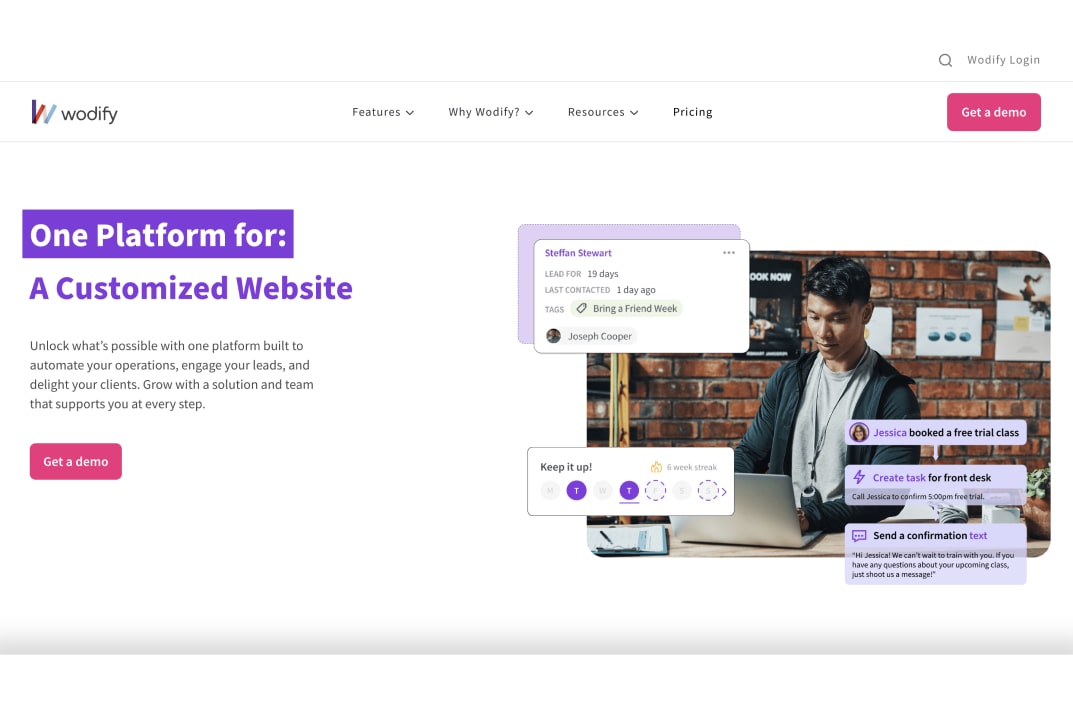
Wodify targets CrossFit boxes and functional fitness trainers with community-based accountability.
Key Accountability Features:
- Workout tracking and benchmarking
- Community leaderboards
- Performance metrics
- Basic messaging
- Class scheduling
Wodify creates accountability through community competition rather than deep individual tracking. It lacks the personal coaching elements found in platforms like FitBudd that emphasize one-on-one relationships.
10. ProCoach by Precision Nutrition
.jpg)
ProCoach specializes in nutrition accountability, making it a good option for trainers who focus heavily on dietary coaching.
Key Accountability Features:
- Daily nutrition habit check-ins
- Automated lesson delivery
- Progress tracking focused on nutrition
- Simple client messaging
- Goal setting for nutrition behaviors
ProCoach is highly specialized for nutrition accountability but lacks comprehensive workout tracking and business management features. Many trainers use it as a complement to other systems rather than a complete solution.
11. TrainingPeaks

TrainingPeaks has long been the standard for endurance coaches and offers detailed metrics for cardio training.
Key Accountability Features:
- Detailed workout tracking
- Training load and fatigue metrics
- Heart rate and power analysis
- Basic messaging
- Annual planning tools
While TrainingPeaks excels at performance metrics for endurance athletes, its interface is technical and can be overwhelming for general fitness clients. It lacks the user-friendly design and comprehensive features of platforms like FitBudd.
12. Total Coaching
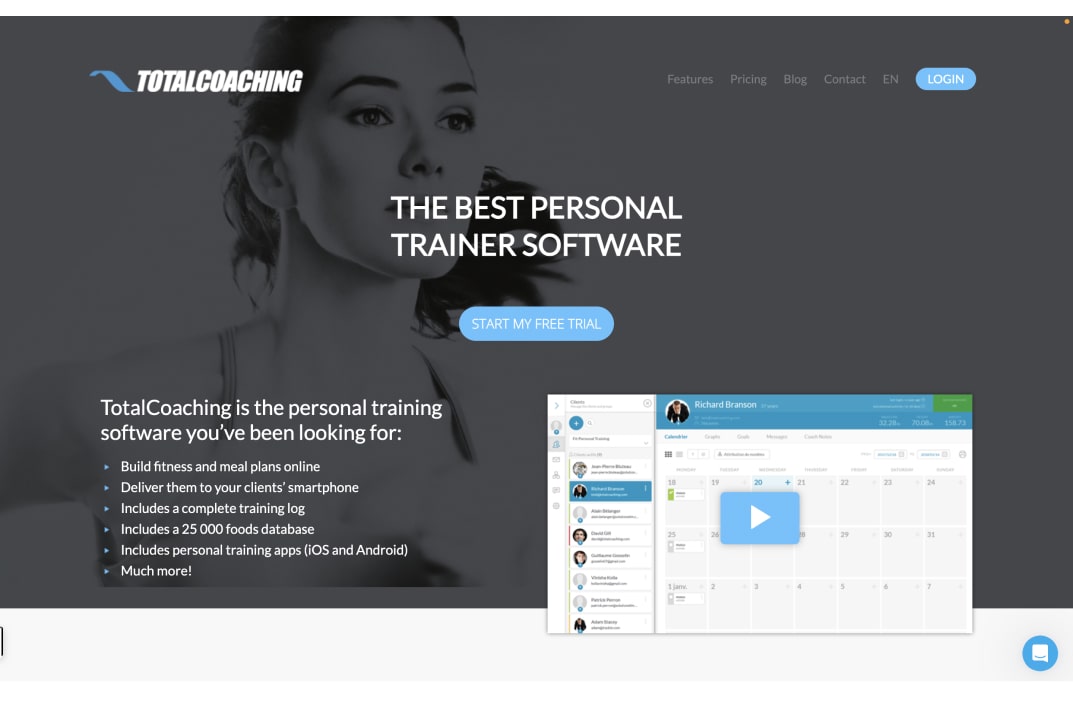
Total Coaching offers trainers a flexible platform with customizable accountability tools.
Key Accountability Features:
- Custom forms and assessments
- Client habit tracking
- Basic progress metrics
- Messaging system
- Program delivery
Total Coaching provides good flexibility but requires significant setup time compared to more streamlined platforms. Its interface isn't as intuitive as market leaders, which may hinder client adoption.
Feature Comparison: What Makes the Best Accountability Apps Stand Out?
When evaluating the best accountability apps for personal trainers, certain features separate the elite options from the merely adequate ones. Workout apps provide structured training programs, tracking, and social features that support accountability and help users stay on track with their fitness goals. Here’s how the top contenders compare for working with clients online:
Essential Features to Look for in Accountability Apps for Personal Trainers
When choosing the best accountability apps for personal trainers, prioritize these critical features:
- Interactive coaching for personalized guidance, accountability, and increased engagement.
- On-demand classes that allow clients to access a variety of workout videos at their convenience, supporting flexible and customized routines.
- Live sessions for real-time classes, direct interaction with coaches, and a sense of community through scheduled group workouts.
Progress Tracking Capabilities
- Body metrics monitoring: Weight, measurements, body fat percentage, and muscle mass are key indicators of progress
- Strength performance: Personal records, weight progression, and tracking progressive overload to ensure continual improvement
- Cardio metrics: Heart rate, distance, time, intensity
- Progress photos: Before/after comparisons with privacy controls
- Custom metrics: Ability to track client-specific indicators
Communication Tools
- Real-time messaging: Instant communication with clients
- Video calling: Face-to-face check-ins and form reviews
- File sharing: Easy exchange of resources and information
- Voice messaging: Quick audio feedback on client progress
- Group messaging: Team challenges and community support
Habit Coaching Features
- Daily check-ins: Simple accountability questions
- Habit streaks: Visual motivation for consistency
- Customizable prompts: Tailored to client goals
- Compliance reporting: Analytics on client adherence
- Behavioral nudges: Automated reminders and encouragement
User Experience Considerations
- Intuitive interface: Easy navigation for both trainer and client
- Mobile optimization: Full functionality on smartphones, tablets, and other smart devices enhances user experience and allows seamless workout tracking.
- Smart device integration: Connectivity with Apple Watch, fitness trackers, and other smart devices enables tailored fitness programs and real-time progress monitoring.
- Offline access: Functionality without a constant internet connection
- Quick loading: Minimal wait times for data and features
Business Enhancement Tools
- Client retention analytics: Insights on engagement patterns
- Custom branding: Professional presentation of your business
- Marketing integrations: Connection with lead generation systems
- Payment processing: Seamless billing and subscription management
- Client acquisition tools: Features to attract and convert prospects
- Coaching business support: Tools to automate tasks, enhance client experience, and scale your coaching business
- Gym owner features: Client management, workflow streamlining, and community-building tools designed for gym owners
How Accountability Apps Transform the Trainer-Client Relationship
The best accountability apps for personal trainers do more than just track workouts—they fundamentally change how trainers interact with clients. These apps support clients of all fitness levels by offering adaptable and personalized features, ensuring inclusivity and adequate progress for everyone. Here’s how these tools are reshaping the fitness coaching landscape:
Extended Coaching Presence
Quality accountability apps extend your influence beyond in-person sessions. Through daily check-ins, habit tracking, and real-time messaging, you maintain a consistent presence in your clients' lives. This ongoing connection creates accountability pressure that simply can't exist with traditional once-a-week training sessions.
Data-Driven Coaching Decisions
With comprehensive tracking tools, trainers can make programming decisions based on objective data rather than client self-reporting. When a client reports feeling stronger, you can verify this against their performance metrics. When someone claims to be following their nutrition plan, their daily food logs provide confirmation.
Scalable Personalization
The most effective accountability apps allow trainers to deliver personalized coaching to more clients without sacrificing quality. Automated check-ins combined with personalized feedback create a hybrid coaching model that balances efficiency with individual attention. This scalability is particularly important as the demand for accountability coaching grows.
Building Client Self-Efficacy
Quality accountability tools help clients develop internal motivation by making progress visible. As clients see their consistency tracked through habit streaks and progress charts, they build confidence in their ability to maintain healthy behaviors. This self-efficacy is crucial for long-term success.
Client Tracking Spreadsheets vs. Accountability Apps: Which is Better?
Many personal trainers start their accountability journey using client tracking spreadsheets before transitioning to dedicated apps. Let’s compare these approaches:
Client Tracking Spreadsheets for Fitness Coaches
- Customizable to your coaching style and client needs.
- Easy to share via Google Sheets or Excel.
- No subscription fees—just basic software.
- Free app options are available for trainers starting out, offering basic features at no cost.
Dedicated Accountability Apps
- Streamlined client management and progress tracking.
- Automated reminders and notifications.
- Integration with platforms like Apple Health for comprehensive data tracking from multiple devices and apps.
- Often include built-in messaging and scheduling.
Client Tracking Spreadsheets for Fitness Coaches
Dedicated Accountability Apps
For most trainers, the transition from spreadsheets to dedicated accountability apps represents a significant professional upgrade. While spreadsheets offer a low-cost starting point for managing unlimited clients, they simply can't match the engagement power and time-saving automation of platforms like FitBudd.
Implementing Accountability Apps in Your Training Business: Best Practices
Adopting the best accountability apps for personal trainers requires more than just signing up for a service. It’s essential to ensure the app’s features align with your unique coaching style, allowing you to personalize client experiences and maximize engagement. Here’s how to effectively implement these tools in your business:
1. Start with Clear Expectations
Before introducing any accountability app to clients, establish clear expectations about:
- Required check-in frequency
- Response time standards (yours and theirs)
- Consequences of missed check-ins
- Privacy protections for their data
- How feedback will be delivered
2. Create an Onboarding System
Develop a systematic onboarding process that includes:
- Tutorial videos for app navigation
- First check-in walkthrough
- Template messages for everyday situations
- FAQ document for troubleshooting
- Schedule for initial progress assessments
3. Establish Accountability Rhythms
Design recurring accountability touchpoints:
- Daily habit check-ins
- Weekly progress photo submissions
- Bi-weekly measurement updates
- Monthly comprehensive reviews
- Quarterly goal reassessments
4. Build Compliance Incentives
Create systems that reward consistent accountability:
- Recognition for perfect check-in streaks
- Small rewards for milestone achievements
- Community celebrations of progress
- Gamification elements like points or levels
- Exclusive content for highly engaged clients
5. Leverage Data for Personalization
Use the data collected to enhance the training experience:
- Adjust programs based on compliance patterns
- Identify sticking points through habit data
- Personalize messaging based on engagement metrics
- Create custom challenges for specific weaknesses
- Show correlations between check-in consistency and results
The Future of Accountability in Personal Training
As we look beyond 2025, several trends are emerging in the accountability app space:
Platforms like Future App are gaining traction by leveraging personalized coaching, accountability, and integration with wearable devices to help users visualize and achieve their future fitness goals. Trainers and fitness professionals are also increasingly evaluating other apps to compare features, user experience, and stay ahead of industry developments.
AI-Enhanced Coaching
Artificial intelligence is beginning to supplement human coaching by identifying patterns and suggesting interventions. The best accountability apps for personal trainers are integrating AI to flag potential issues before they become problems, such as detecting when a client's check-in language indicates potential burnout or motivation issues.
Biometric Integration
Advanced wearable technology is creating new accountability dimensions. Beyond simple step counting, devices now monitor sleep quality, stress levels, recovery metrics, and even blood glucose levels. Leading accountability apps are integrating these data streams to provide trainers with comprehensive client health profiles.
Behavioral Psychology Implementation
The most sophisticated accountability platforms are incorporating principles from behavioral psychology to improve client adherence. Features like variable reward schedules, commitment contracts, and social proof are being systematically implemented to boost motivation and consistency.
Community-Enhanced Accountability
While one-on-one coaching remains the core of personal training, group accountability is proving to be a powerful supplementary force. Forward-thinking accountability apps are creating opt-in community features that allow clients to share their workout routine and upport each other while maintaining the primary trainer-client relationship.
How to Choose the Right Accountability App for Your Training Business
With so many options available, selecting the best accountability app for your personal training business requires careful consideration. Popular choices include the Peloton app, Nike Training Club, Shred app, and Train Hard app—each offering unique features such as live classes, structured programs, AI-powered customization, and habit-building tools. Notably, the Peloton app can be used without Peloton equipment, providing flexibility for users with different fitness setups.
Here’s a framework to guide your decision:
- Consider the range of workout types offered, including the availability of cardio workouts, which are essential for many clients.
- Evaluate app compatibility with various devices and equipment.
- Assess features like community support, progress tracking, and program customization.
Assess Your Current Needs
- How many clients are you currently managing?
- What accountability methods are you currently using?
- Which aspects of accountability take the most time?
- What client complaints do you hear most often?
- What metrics are most important for your training style?
Evaluate Future Goals
- How do you plan to scale your business?
- Will you be adding team members or staying solo?
- Are you planning to offer new service tiers?
- Will you be expanding into nutrition or lifestyle coaching?
- Do you plan to create digital products or online courses?
Consider Client Demographics
- What is the tech comfort level of your typical client?
- Do most clients use iOS or Android devices?
- What fitness tracking tools do clients already use?
- How frequently do clients want communication?
- What motivates your typical client demographic?
Review Integration Requirements
- What business software do you currently use?
- Which payment processor do you prefer?
- What scheduling system are you committed to?
- Which marketing tools are essential to your workflow?
- What wearable devices do your clients commonly use?
After answering these questions, you'll be better positioned to select an accountability app that aligns with both your current needs and future goals. For many trainers, FitBudd emerges as the optimal choice due to its comprehensive feature set, scalability, and excellent user experience for both trainers and clients.
The Accountability Advantage
In 2025, the difference between struggling personal trainers and thriving fitness businesses often comes down to one factor: systematic accountability. The best accountability apps for personal trainers don't just track data—they create meaningful connections between coaches and clients that drive consistent action and measurable results.
While many options exist in the marketplace, FitBudd stands out as the most comprehensive solution for trainers serious about client success. Its combination of robust tracking tools, intuitive user experience, and business growth features creates an unmatched platform for modern fitness professionals.
As client expectations continue to evolve, the ability to provide ongoing accountability between sessions has transformed from a luxury to a necessity. Trainers who embrace these powerful tools position themselves at the forefront of the industry, delivering superior results while building more sustainable businesses.
FAQs About Accountability Apps for Personal Trainers
What is the most important feature in an accountability app for personal trainers?
The most crucial feature is robust two-way communication. While tracking metrics is important, the ability to provide timely, contextual feedback is what truly drives client success. Look for apps with integrated messaging, video check-ins, and comment features on all client submissions. The best accountability apps for personal trainers facilitate meaningful conversations about progress, not just data collection.
How much time should trainers spend on client accountability each day?
With an efficient accountability app, most trainers can effectively manage client check-ins in 1-2 hours per day, regardless of client volume. The key is establishing systems that separate urgent communications from routine check-ins. Platforms like FitBudd help trainers prioritize interactions through notification settings and dashboard organization, ensuring critical client needs receive immediate attention while routine updates are handled efficiently.
Can accountability apps replace in-person training sessions?
While accountability apps significantly extend a trainer's influence between sessions, they work best as a complement to rather than a replacement for live coaching. The most successful trainers use accountability tools to reinforce and monitor adherence to plans established during in-person or live virtual sessions. This hybrid approach combines the irreplaceable value of direct coaching with the consistent accountability that drives daily decisions.
How do I convince hesitant clients to use an accountability app?
Frame the app as an included premium service rather than an additional requirement. Emphasize how it extends your availability to them, provides a private space for questions, and helps you customize their program based on real data. For very hesitant clients, consider offering a two-week trial period where you showcase the value through highly responsive coaching and meaningful insights they wouldn't receive otherwise.
What privacy concerns should trainers address when using accountability apps?
Transparent data policies are essential for building client trust. Clearly communicate how progress photos are stored, who has access to client information, and what happens to their data if they discontinue services. Choose platforms with strong security credentials, private messaging capabilities, and a free version for initial testing. FitBudd, for example, offers client-controlled privacy settings and secure data storage that meets industry standards for personal information protection.
How do accountability apps impact trainer efficiency and business growth?
Well-implemented accountability systems can dramatically improve business efficiency by automating routine check-ins, centralizing client communications, and providing data-driven insights for program adjustments. Many trainers report being able to effectively serve 50-100% more clients after implementing structured accountability systems. Additionally, the enhanced client experience typically leads to better retention rates and more referrals, creating organic business growth.
Are free accountability apps effective for professional trainers?
While free apps can provide basic accountability features, they typically lack the comprehensive tools needed for professional coaching relationships. Most free apps focus on individual use rather than the trainer-client dynamic, missing critical features like custom branding, business management tools, and scalable client management. Professional trainers generally find that the return on investment for paid platforms like FitBudd far exceeds the subscription cost through improved client results and business efficiency.





%20to%20Become%20a%20Certified%20Personal%20Trainer-min.jpg)





